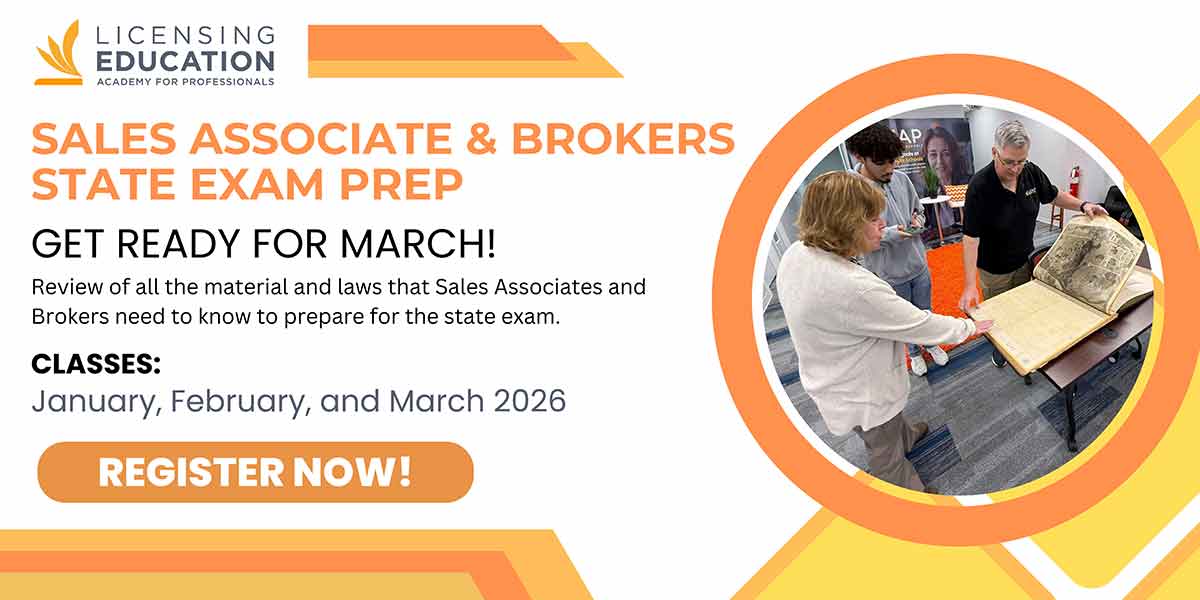Every real estate student eventually reaches the same moment: you finish your course, pass your exam, celebrate your accomplishment… and then realize that becoming a successful real estate agent involves skills no textbook ever mentioned. Understanding what real estate school doesn’t teach you can make the difference between feeling lost in your first months or stepping confidently into your new career with clarity and direction.
Real estate school teaches you laws, math formulas, ethics, and the foundation you need to get licensed. But the daily reality of working with real people, building a business, and navigating unpredictable situations feels entirely different. This is where the learning truly begins, and where experience becomes your greatest teacher.
The Emotional Side of Real Estate
One of the biggest surprises for new agents isn’t the paperwork or the marketing; it’s the emotions. People buy and sell homes for deeply personal reasons: new beginnings, changes, challenges, dreams, fears. Real estate school doesn’t prepare you for clients who cry at the closing table, couples who argue during showings, or families who feel overwhelmed by the process.
A skilled agent learns how to listen, reassure, guide, and stay calm even when clients are not. Emotional intelligence quickly becomes one of your most valuable tools. Understanding human nature often matters more than understanding square footage.
How to Find Your First Clients
Many new agents assume that once they get their license, clients will naturally appear. The truth is, school prepares you to work with clients, not to find them. Prospecting, networking, and building visibility are real skills that take time to develop.
You learn quickly that people don’t hire you just because you have a license. They hire you because they trust you. Confidence, communication, and consistency play a much bigger role than most students expect. The more you put yourself out there, both online and in person, the easier it becomes to attract your first leads.
Schools like LEAP Orlando help you understand the educational side of real estate, but the business-building side is something you develop through practice, habits, and relationship-building.
Managing Time When You Have No Set Schedule
Real estate offers flexibility, but that flexibility can be overwhelming. When no one tells you what time to wake up, when to make calls, or how many appointments you need each week, it’s easy to fall into inconsistent patterns.
This is another thing real estate school doesn’t teach you: you are the structure. You are the manager. You are the motivator.
Successful agents learn to:
- Plan their days with intention
- Protect their productive time
- Balance education, prospecting, and client care
- Stay consistent even during slow weeks
Your calendar becomes your compass. Without structure, even talented agents struggle. With structure, new agents quickly find their rhythm.
The Art of Communication Under Pressure
Real estate conversations don’t always follow scripts. They involve negotiation, emotion, conflict, and fast decision-making. School teaches you what the rules are, but not how to explain them in difficult conversations.
You learn through experience how to:
- Deliver news that clients don’t want to hear
- Explain complicated processes in simple terms
- Keep everyone calm when issues arise
- Stand firm while staying professional
- Negotiate with confidence and clarity
Communication becomes the foundation of your brand, and it’s something you improve every time you speak with a buyer, seller, lender, inspector, or fellow agent.
Building Confidence When Everything Feels New
Confidence is a crucial skill in real estate, yet it’s something no school can truly teach. Confidence develops through:
- Mistakes you survive
- Challenges you overcome
- Conversations you practice
- Opportunities you pursue
- Knowledge you apply
Every agent learns that confidence doesn’t magically appear. It shows up after you do the work. It grows each time you step into an unfamiliar situation and realize you can handle it.
Programs like LEAP Orlando help you build a strong educational foundation, but real-world confidence comes from applying that knowledge with actual clients and actual outcomes.
Understanding the Pace of the Market
School teaches you laws and principles, but it doesn’t prepare you for how fast or how slow transactions can move. Some deals come together in a week; others take months. Some clients need daily reassurance. Others disappear for weeks and return ready to make an offer.
A new agent quickly learns how to adapt to:
- Busy seasons
- Slow periods
- Changing interest rates
- Shifts in seller or buyer behavior
- Unique demands of each neighborhood
Market knowledge becomes something you study continuously. It isn’t just an exam topic; it is the heart of your daily work.
What It Really Takes to Build a Reputation
Real estate school won’t tell you that your reputation begins long before your first closing. Every conversation, every follow-up, and every small interaction becomes part of your brand. Professionalism, honesty, and responsiveness become as important as marketing skills.
Clients remember how you made them feel. They remember whether you called back quickly, explained things clearly, and guided them with patience. Referrals are one of the most powerful lead sources. Comes from consistent care, not from perfection.
The Importance of Staying Educated After the Exam
Once you pass the state exam, it’s tempting to think you are “done” learning. In reality, real estate is one of the fastest-changing industries, and staying educated is the only way to stay competitive.
This includes:
- Market updates
- New laws
- Contract changes
- Technology trends
- Practical skills
LEAP Orlando helps new agents understand the core of Florida real estate, but long-term success comes from continuously expanding your knowledge. Education is not a one-time event; it’s an ongoing investment in your career.
Your Career Becomes What You Make It
The final thing real estate school doesn’t teach you is that you are building a business, not just starting a job. You’re creating something from the ground up: your energy, your strategy, your brand, your schedule, your relationships.
There will be days when everything feels uncertain, but there will also be moments when everything clicks. You’ll meet clients who inspire you, close deals that change lives, and realize that real estate isn’t just a job, it is a profession built on service, trust, and human connection.
When you embrace the parts of real estate that school can’t teach, you start growing into the agent you’re meant to become.






